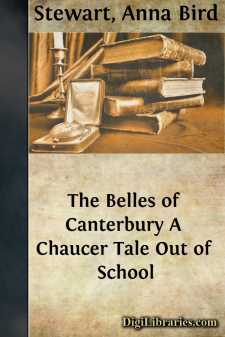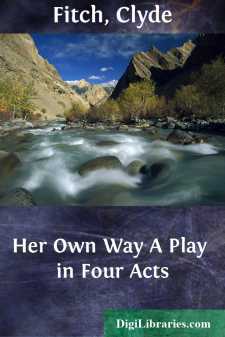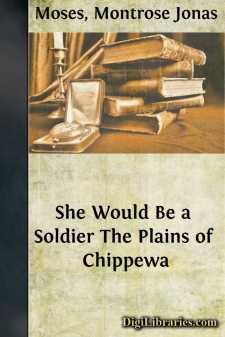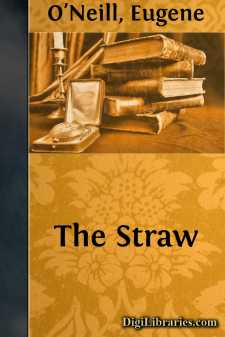Drama
American Books
Sort by:
by:
Upton Sinclair
THE NATUREWOMAN ACT I [Scene shows a luxuriously furnished drawing-room. Double doors, centre, opening to hall and stairway. Grand piano at right, fireplace next to it, with large easy-chair in front. Centre table; windows left, and chairs.] [At rise: ETHEL standing by table; a beautiful but rather frail girl of sixteen; opening a package containing photograph in frame.] ETHEL. Oceana! Oceana! [She...
more...
by:
Clyde Fitch
ACT I A charming room in the Tillmans' house. The walls are white woodwork, framing in old tapestries of deep foliage design, with here and there a flaming flamingo; white furniture with old, green brocade cushions. The room is in the purest Louis XVI. The noon sunlight streams through a window on the left. On the opposite side is a door to the hall. At back double doors open into a corridor which...
more...
COSTUMES. The simplicity of the costuming as well as of the stage setting makes the play an easy one for amateurs to produce. The dress of the four school girls should be as modern as possible. Their hair should be elaborately arranged. Hippolyta should wear the dress of an Amazon, armor if possible, or a short skirt, sandals laced high with crossed strings, waist to match the skirt, a crown, and a...
more...
by:
Clyde Fitch
The nursery. Half-past two in the afternoon. A cool, delightful white room, with a frieze of children playing in the ocean spray; shelves of bright-colored books on the walls, and the months of a large calendar by Elizabeth Shippen Green framed underneath. There is a deep bow-window at the back; the principal door is at the Left, and a smaller one on the Right. Toys of all sizes, for all ages, are...
more...
MORDECAI MANUEL NOAH (1785-1851) Mr. Noah was born in Philadelphia, July 19, 1785, the son of Portuguese Jewish descent, it being stated by some sources that his father not only fought in the Revolutionary Army, but was a sufficient friend of George Washington to have the latter attend his wedding. In his early years, he was apprenticed, according to the custom of the day, to a carver and gilder, but...
more...
by:
Eugene O'Neill
Act One Act One: Scene One The kitchen of the Carmody home on the outskirts of a manufacturing town in Connecticut. On the left, forward, the sink. Farther back, two windows looking out on the yard. In the left corner, rear, the icebox. Immediately to the right of it, in the rear wall, a window opening on the side porch. To the right of this, a china cupboard, and a door leading into the hall where the...
more...
by:
Samuel Low
Very little is known about the author of "The Politician Out-witted," a play which I have selected as representative of the efforts of the American drama, as early as 1789, to reflect the political spirit of the time. Assiduous search on the part of the present editor has failed to bring to light any information from any of the historical societies regarding Mr. Low, except that he was born on...
more...
by:
Thomas Godfrey
THOMAS GODFREY, Jr. (1736-1763) Thomas Godfrey, Jr., was born in Philadelphia, on December 4, 1736, the son of a man who himself won fame as an inventor of the Quadrant. Godfrey, Senior, was a friend of Benjamin Franklin, the two probably having been drawn together by their common interest in science. When Godfrey, Senior, died, December, 1749, it was Franklin who wrote his obituary notice. Young...
more...
by:
Horace Holley
INTRODUCTION The first two or three of these "plays" (I retain the word for lack of a better one) began themselves as short stories, but in each case I found that the dramatic element, speech, tended to absorb the impersonal element of comment and description, so that it proved easier to go on by allowing the characters to establish the situation themselves. As I grew conscious of this...
more...
THE FLUTTER OF THE GOLDLEAF Scene: Laboratory in the attic of the Warner cottage. At right, toward rear, entrance from down-stairs. A rude partition, left, with door in centre. Window centre rear. Large kitchen table loaded with apparatus. Shelves, similarly loaded, against wall near table, right. Wires strung about. A rude couch, bench, and several wooden chairs. Time, about 8 p.m. Lamp burns on...
more...











